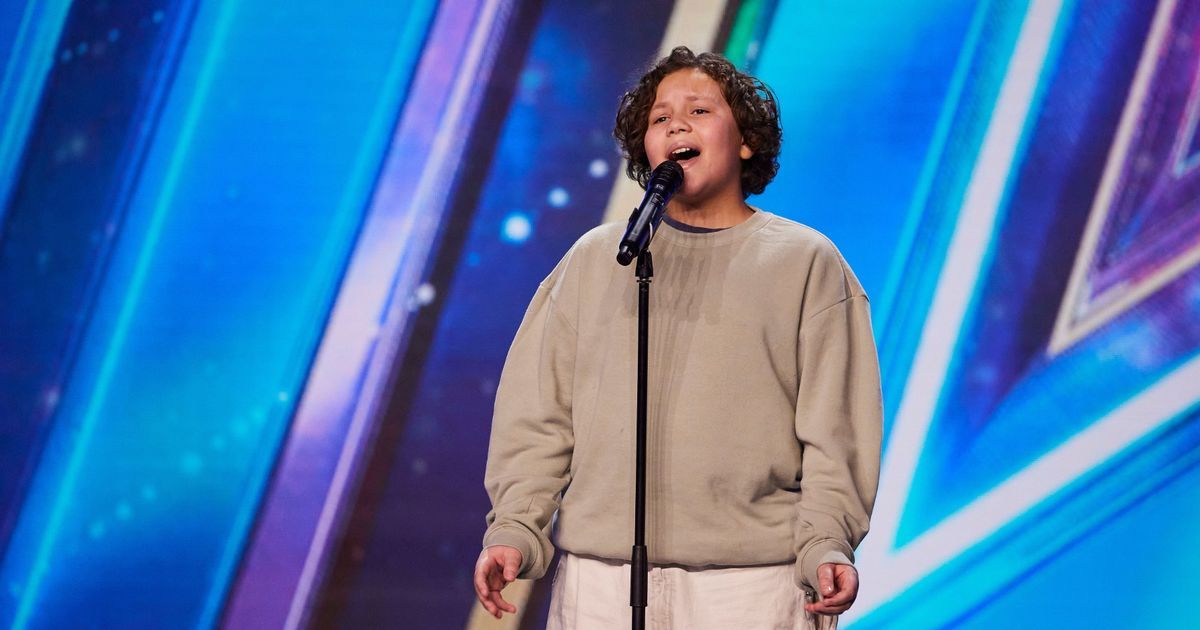Child's Anxiety Stops Britain's Got Talent Performance

Table of Contents
Understanding Childhood Anxiety and Performance Anxiety
What is Childhood Anxiety?
Childhood anxiety is more than just feeling nervous; it's a persistent and overwhelming feeling of fear and worry that significantly impacts a child's daily life. Unlike the occasional butterflies before a test, childhood anxiety manifests as persistent and excessive worry, often accompanied by physical symptoms. It can interfere with school, social interactions, and overall well-being. The symptoms and severity vary greatly, making early identification and intervention crucial.
- Common symptoms of anxiety in children: Stomach aches, headaches, difficulty sleeping, irritability, clinginess, tantrums, bedwetting, and changes in appetite.
- The role of genetics and environment: A family history of anxiety disorders can increase a child's risk, as can stressful life events, such as family discord, bullying, or significant changes in their routine.
- Different types of anxiety disorders affecting children: These include generalized anxiety disorder (GAD), separation anxiety disorder, social anxiety disorder (social phobia), panic disorder, and specific phobias.
Performance Anxiety in Children
Performance anxiety is a specific type of anxiety that centers around performing in front of others. It's a subset of social anxiety but is specifically triggered by the anticipation or act of performing, whether it's a school play, a musical recital, or, as in this case, a high-stakes audition like Britain's Got Talent. The pressure to succeed, fear of judgment, and the spotlight's intensity can exacerbate pre-existing anxiety or trigger it in children who haven't previously experienced it.
- Physical symptoms of performance anxiety: Rapid heartbeat, sweating, trembling, shortness of breath, nausea.
- Cognitive symptoms: Negative self-talk ("I'm going to mess up," "Everyone will laugh at me"), catastrophic thinking (exaggerated fears of failure), difficulty concentrating.
- Behavioral symptoms: Avoidance of performance situations, procrastination, excessive preparation, seeking constant reassurance.
The Impact of the Britain's Got Talent Incident
Public Reaction and Media Coverage
The Britain's Got Talent incident sparked a wave of reactions online and in the media. While many viewers expressed empathy and support for the child, others offered criticism, highlighting the diverse perspectives on handling such situations on a public platform. The media's portrayal played a crucial role in shaping public perception, underscoring the importance of responsible reporting when dealing with sensitive issues like childhood anxiety.
- Examples of supportive comments and criticism online: Social media platforms saw a mix of messages, ranging from supportive comments offering encouragement and understanding to more critical responses questioning the child's preparedness or the show's handling of the situation.
- Discussion of the ethical considerations of broadcasting such an event: The broadcast raised questions about the ethical implications of showcasing a child's emotional distress on national television. Debates ensued on the balance between entertainment and the well-being of young participants.
- Analysis of the media's role in shaping public perception of childhood anxiety: Media coverage can influence public understanding and perceptions of child anxiety. Responsible reporting is vital to promote empathy, understanding, and appropriate responses to the issue.
The Child's Perspective
From the child's perspective, the experience likely involved a range of overwhelming emotions. While we can only speculate without direct access to the child's feelings, it's crucial to approach this situation with empathy and understanding. The intense pressure of the audition combined with the fear of failure could have led to a debilitating level of anxiety.
- Possible feelings of shame, disappointment, and embarrassment: The child may have felt profound disappointment at not being able to complete their performance, compounded by feelings of shame and embarrassment from the public display of their anxiety.
- The long-term emotional impact of the experience: The event could have long-term emotional consequences if not properly addressed. Professional support is vital to help the child process their experience and develop coping mechanisms.
- Importance of supportive family and professional help: The child's family and support system play a critical role in helping them overcome this experience. Seeking professional help from a child psychologist or therapist is crucial for effective healing and preventing future anxiety episodes.
Helping Children Overcome Performance Anxiety
Strategies for Parents and Guardians
Parents and caregivers have a vital role to play in supporting children struggling with performance anxiety. Creating a nurturing environment, focusing on effort rather than outcome, and teaching coping mechanisms are all crucial steps.
- Creating a supportive and encouraging environment: Avoid pressure and focus on fostering a love of the activity rather than solely on achieving perfection. Celebrate effort and progress, not just results.
- Positive reinforcement and praise: Offer encouragement and praise for effort, participation, and resilience. Focus on the child's strengths and progress, not just their shortcomings.
- Teaching coping mechanisms: Techniques such as deep breathing exercises, visualization, and positive self-talk can help children manage their anxiety symptoms.
Professional Help for Anxiety
Seeking professional help is often essential in managing childhood anxiety, especially when it's severe or significantly impacting a child's life. Therapy can provide children with the tools and strategies they need to overcome their anxiety.
- Types of therapy that are effective for anxiety: Cognitive Behavioral Therapy (CBT) is a highly effective approach, teaching children to identify and challenge negative thoughts and develop healthier coping mechanisms.
- Role of medication in severe cases: In some cases, medication may be recommended by a doctor or psychiatrist to manage severe anxiety symptoms. This should always be done under professional guidance.
- Finding qualified child psychologists or therapists: Resources are available to help locate qualified professionals who specialize in treating childhood anxiety disorders.
Conclusion
The Britain's Got Talent incident brought the often-hidden issue of child anxiety into the spotlight, highlighting the impact of performance pressure on young performers. Understanding childhood anxiety, including its various manifestations like performance anxiety, is crucial for providing effective support. By creating supportive environments, teaching coping mechanisms, and seeking professional help when needed, we can help children overcome their anxiety and pursue their dreams without fear. Don't let anxiety stop your child's dreams; learn how to help your child manage performance anxiety and seek professional support if needed. For further information and resources, please visit the Anxiety & Depression Association of America (ADAA) website or contact your local mental health services. Understanding child anxiety is a crucial step toward providing the support needed for healthy development and a bright future.

Featured Posts
-
 Assistir Portuguesa X Corinthians Online Guia Do Paulistao
May 05, 2025
Assistir Portuguesa X Corinthians Online Guia Do Paulistao
May 05, 2025 -
 Final Destinations Scariest Death Scene Is Back A 22 Year Wait Ends
May 05, 2025
Final Destinations Scariest Death Scene Is Back A 22 Year Wait Ends
May 05, 2025 -
 Cocaines Global Expansion Analyzing The Role Of Potent Powder And Narco Sub Transportation
May 05, 2025
Cocaines Global Expansion Analyzing The Role Of Potent Powder And Narco Sub Transportation
May 05, 2025 -
 Simone Biles Kentucky Derby Appearance Riders Up
May 05, 2025
Simone Biles Kentucky Derby Appearance Riders Up
May 05, 2025 -
 Horners Prank Max Verstappens Fatherhood Quip
May 05, 2025
Horners Prank Max Verstappens Fatherhood Quip
May 05, 2025
Latest Posts
-
 Maks Ferstappen Radostnaya Novost O Rozhdenii Docheri
May 05, 2025
Maks Ferstappen Radostnaya Novost O Rozhdenii Docheri
May 05, 2025 -
 Max Verstappen Paternity And The Miami Grand Prix
May 05, 2025
Max Verstappen Paternity And The Miami Grand Prix
May 05, 2025 -
 New Parent Max Verstappens Childs Birth And Name Unveiled
May 05, 2025
New Parent Max Verstappens Childs Birth And Name Unveiled
May 05, 2025 -
 New Parent Max Verstappen Races To Miami Grand Prix
May 05, 2025
New Parent Max Verstappen Races To Miami Grand Prix
May 05, 2025 -
 Max Verstappen Paternity And Miami Grand Prix A Double Celebration
May 05, 2025
Max Verstappen Paternity And Miami Grand Prix A Double Celebration
May 05, 2025
